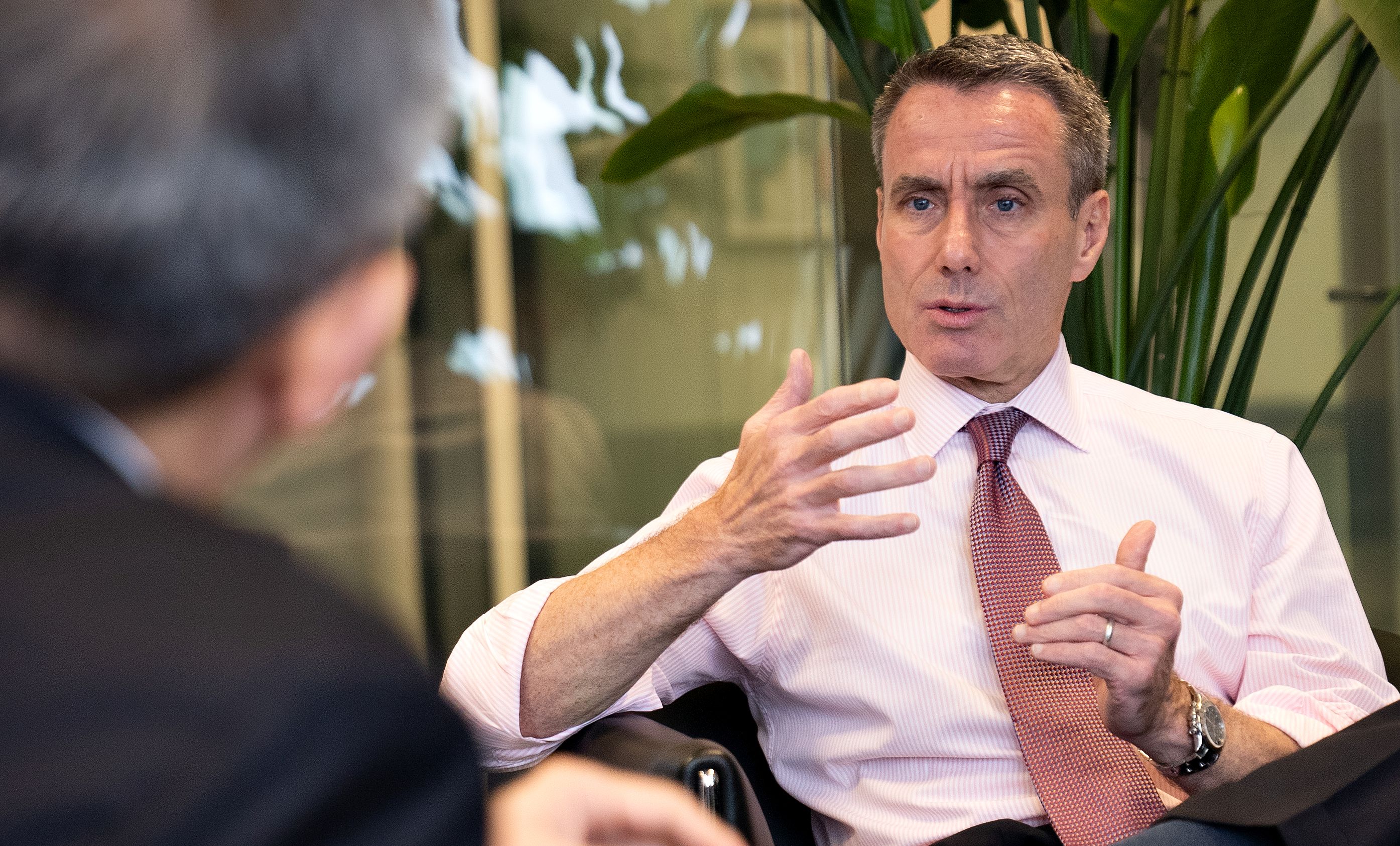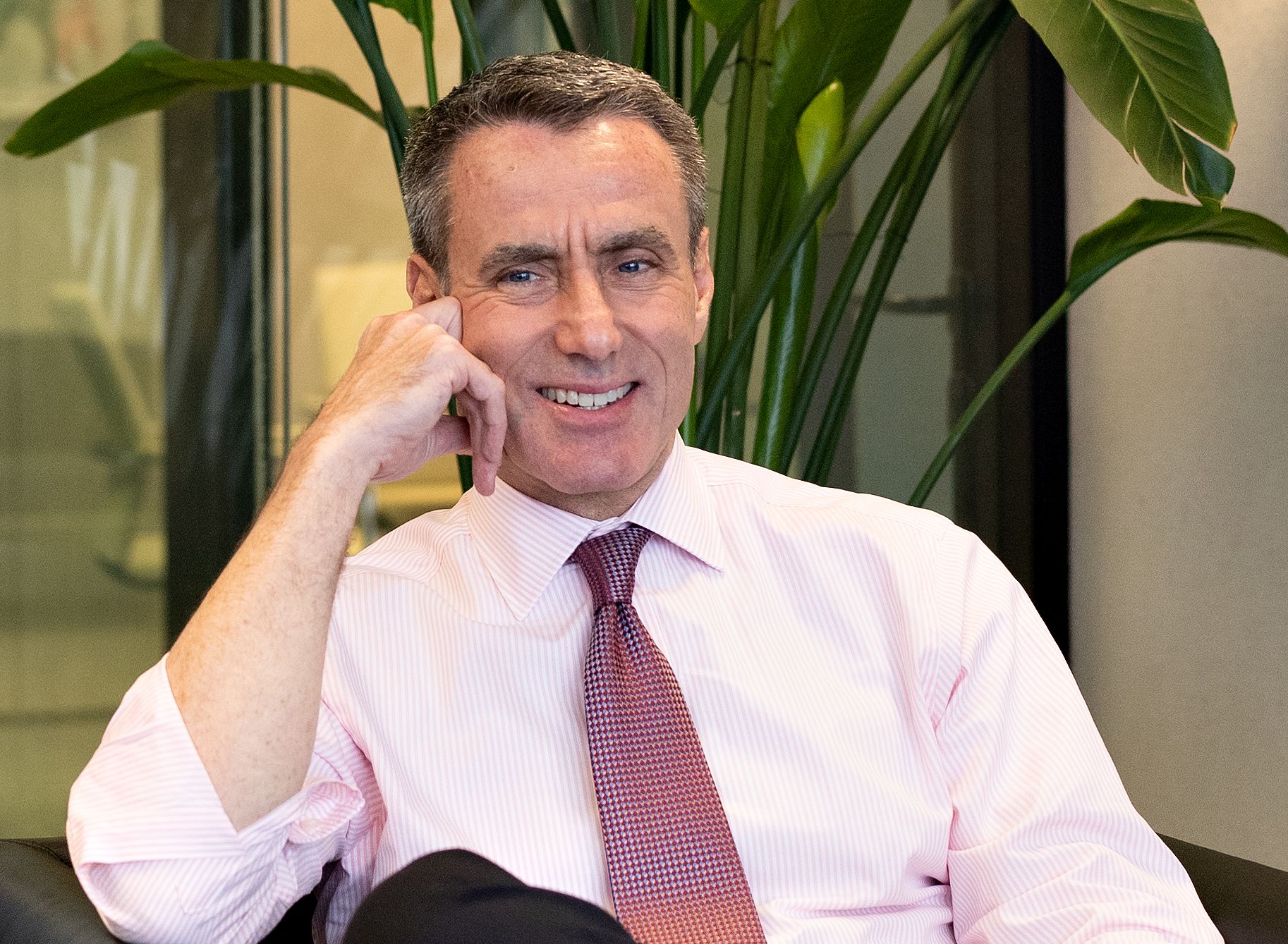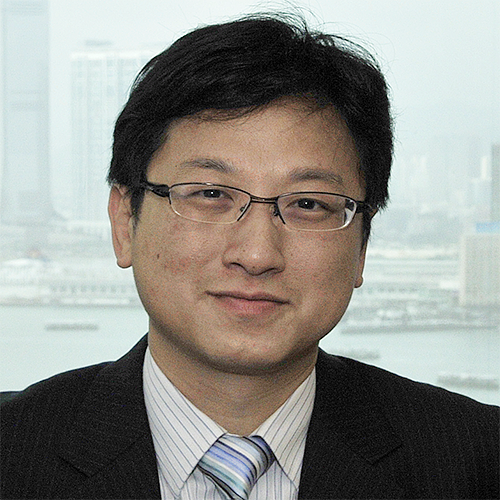Asia – specifically China and India – represents huge opportunities despite the range of geopolitical issues affecting the region. Managing the risk, however, has become top-of-mind for international financial institutions.
“The Chinese market is incredibly important for the global economy across most scenarios that you could envision from a geopolitical perspective,” shares Peter Babej, CEO of Citi Asia Pacific, in an interview with The Asset.

Peter Babej, CEO of Citi Asia Pacific, stresses a point during an interview with The Asset editor-in-chief Daniel Yu.
Babej cites China’s capital markets, “obviously an important part of our business”. In terms of global debt capital markets, China’s renminbi market accounted for 17% in 2021, close to double the 9% in 2012. Total volume raised by Chinese companies as a percentage of global equity capital markets topped 23.9% in 2021, close to a 50% increase in global share from the 16.1% in 2012, based on data from Dealogic. “These are very big moves.”
He characterizes the broadening and deepening of the Chinese capital markets as “a powerful structural trend. It's about migrating a huge asset base from primarily indirect financing – through local banks – to direct financing. The opportunities from this evolution span capital market issuance, trading, investment and wealth management across asset classes.”
India is another “massive opportunity”. From a geopolitical perspective and from a physical infrastructure perspective, it is a different type of market. “In terms of population growth, in terms of GDP per capita, there’s a long runway,” he reckons. “You have some very large and dynamic corporate champions that are becoming increasingly relevant in a global context.”
Critical investments
Babej’s reflections on Asia follow Citi’s unveiling of its first quarter 2023 financial results – and the importance of Asia to Citi, the largest of the US banks with operations in Asia. In the region, its Institutional Client Group (ICG) reported a 6% rise in revenues to US$2.4 billion with profits of US$842 million, up 8%. These numbers are 21% and 25% respectively of the global total. The bank also grew wealth management revenue in Asia by 20% quarter-on-quarter.
These results come two years after Citi chose to exit consumer banking including in the crucial Asian markets of China and India. This comes soon after Jane Fraser’s appointment as the bank’s CEO in April 2021. Since the decision, majority of the sales have been completed with the two remaining Asian markets – Indonesia and Taiwan – anticipated to conclude by the close of 2023. The bank is also progressing with the wind-down of the consumer banking business in China and Korea.
The logic is that with the exit, Citi rids itself of underperforming businesses, streamlines its business composition, and allocates resources to drive revenue growth and returns. Investors, however, appear to be slow in acknowledging the benefits of this shift with the bank’s share price underperforming the competition among US banking peers such as J.P. Morgan, Bank of America, Goldman Sachs, and Morgan Stanley.
Its withdrawal from consumer banking in Asia – except in Hong Kong and Singapore, which are wealth hubs together with Dubai and London – means Citi is concentrating resources in services (treasury and trade solutions or TTS, and securities services), markets, banking (capital markets and advisory, corporate and commercial banking) – which are under ICG – and wealth management.

"The overall opportunity for Asia – and the opportunity for Citi as a unique global firm to add value to our clients – remain rock solid”
With US$4.6 billion in capital now available, the bank is ramping up investments in areas that it considers critical to its future. “We’re focusing on two things: enhancing the businesses that we have – which includes investing into the network – and growing the businesses where we think we can be of much larger scale. In all of this, we’re moving ahead not through acquisitions but through organic growth,” he elaborates.
“If you look at our wealth business, we've been dialing things up in Asia, hiring top advisors, adding new clients, and opening new facilities,” Babej continues. “An important example of our momentum is the pace of private banking client acquisition, which has approximately doubled” in the first quarter of 2023 when compared with the same period in 2022. In Q1 2023, the bank added 8,000 new wealth clients.
The wealth initiative started at the same time when Fraser took the top job in New York. “In terms of macro conditions, we couldn't have picked a more difficult time to turbo-charge wealth. The market has been extremely challenging, and even more so for Asia than for some other markets,” he admits. “But, for us, we're in it for the long run.”
Crown jewel
Similarly, for the ICG business, Babej is pleased with the first quarter results, describing them as “strong numbers”. Especially for TTS and securities services – which Fraser refers to as the crown jewel and which drove the financial outcome for the quarter, the bank is increasing investments. “It's our crown jewel because it's impossible to recreate something like that. Our network has been built over decades. But it needs to be constantly updated and innovated as well.”
He expounds: “What you also have to remember is that the services businesses, when they're operating well, create a lot of value beyond those businesses themselves. For example, think about the positive impact on our FX business when our services businesses are humming – with cross-border flows in TTS as just one example.”
Babej recognizes that while the opportunity to grow the business in the region with its refreshed model makes sense for Citi, the business environment has become far more complex with numerous geopolitical entanglements. “It’s absolutely true that we’re in the most complex period that we’ve lived in our lifetimes. [And] from a risk management perspective, we have to think about that all the time on behalf of our clients, and on behalf of our own institution. The value of global minded support and advice in an environment like that is actually even more important.”
But he remains confident of what’s ahead for a global financial institution like Citi in Asia. “Even though geopolitics can have a dramatic impact on business scenarios, the overall opportunity for Asia – and the opportunity for Citi as a unique global firm to add value to our clients – remain rock solid across all those scenarios.”
In the region, Citi will also need to contend with robust competition, including in both TTS and securities services. To remain relevant to clients, the likes of Bank of America, BNP Paribas, Deutsche Bank, HSBC, J.P. Morgan, and Standard Chartered, together with regional players from Singapore such as DBS and UOB – which acquired Citi's consumer banking business in Taiwan (DBS), and Indonesia, Malaysia, Thailand and Vietnam (UOB) – are also making significant investments to expand their operations.
The full write-up of the exclusive interview with Babej will be published in The Asset magazine, June issue, where he also shares his views on why he doesn’t like the word cross-selling, Citi’s approach to ESG, risk management in an era of geopolitics, and being global in a period of deglobalization. To secure your copy, please email [email protected]









